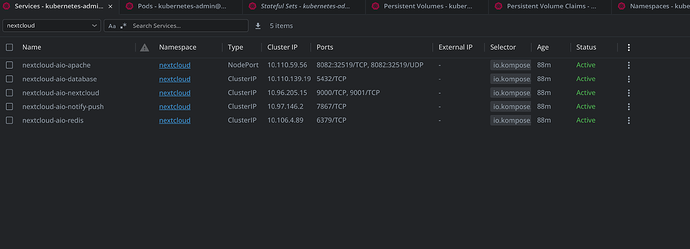Support intro
Sorry to hear you’re facing problems. 
The community help forum (help.nextcloud.com) is for home and non-enterprise users. Support is provided by other community members on a best effort / “as available” basis. All of those responding are volunteering their time to help you.
If you’re using Nextcloud in a business/critical setting, paid and SLA-based support services can be accessed via portal.nextcloud.com where Nextcloud engineers can help ensure your business keeps running smoothly.
Getting help
In order to help you as efficiently (and quickly!) as possible, please fill in as much of the below requested information as you can.
Before clicking submit: Please check if your query is already addressed via the following resources:
- Official documentation (searchable and regularly updated)
- How to topics and FAQs
- Forum search
(Utilizing these existing resources is typically faster. It also helps reduce the load on our generous volunteers while elevating the signal to noise ratio of the forums otherwise arising from the same queries being posted repeatedly).
Some or all of the below information will be requested if it isn’t supplied; for fastest response please provide as much as you can. ![]()
The Basics
- Nextcloud Server version (e.g., 29.x.x):
latest helm chart from : https://github.com/nextcloud/all-in-one
- Operating system and version (e.g., Ubuntu 24.04):
Ubuntu 24.04
- Installation method (e.g. AlO, NCP, Bare Metal/Archive, etc.)
k8s
Summary of the issue you are facing:
Unable to access nextcloud start page.
Following is the status of k8s pods:
Steps to replicate it (hint: details matter!):
Log entries
Nextcloud pods logs are:
System config value one-click-instance set to boolean true
System config value one-click-instance.user-limit set to integer 100
System config value one-click-instance.link set to string https://nextcloud.com/all-in-one/
support already enabled
Config value were not updated
Adjusting log files...
System config value upgrade.cli-upgrade-link set to string https://github.com/nextcloud/all-in-one/discussions/2726
System config value logfile set to string /var/www/html/data/nextcloud.log
Config value were not updated
System config value updatedirectory set to string /nc-updater
System config value maintenance_window_start set to integer 100
Applying network settings...
System config value allow_local_remote_servers set to boolean true
System config value davstorage.request_timeout set to integer 3600
System config value trusted_domains => 1 set to string nextcloud.example.com
System config value overwrite.cli.url set to string https://nextcloud.example.com/
System config value documentation_url.server_logs set to string https://github.com/nextcloud/all-in-one/discussions/5425
System config value htaccess.RewriteBase set to string /
Error updating .htaccess file, not enough permissions, not enough free space or "overwrite.cli.url" set to an invalid URL?
System config value dbpersistent set to boolean false
System config value auth.bruteforce.protection.enabled set to boolean true
System config value ratelimit.protection.enabled set to boolean true
System config value files_external_allow_create_new_local set to boolean false
No such app enabled: nextcloud-aio
notify_push is up-to-date or no updates could be found
System config value trusted_proxies => 0 set to string 127.0.0.1
System config value trusted_proxies => 1 set to string ::1
System config value trusted_proxies => 10 set to string 10.100.74.0/16
Config value were not updated
+ '[' '' = true ']'
+ set +x
Connection to nextcloud-aio-apache (10.106.221.0) 8082 port [tcp/*] succeeded!
[01-Feb-2025 22:44:35] NOTICE: fpm is running, pid 232
[01-Feb-2025 22:44:35] NOTICE: ready to handle connections
GET / HTTP/1.1
Host: 192.168.0.113:31561
User-Agent: Mozilla/5.0 (X11; Linux x86_64; rv:134.0) Gecko/20100101 Firefox/134.0
Accept: text/html,application/xhtml+xml,application/xml;q=0.9,*/*;q=0.8
Accept-Language: en-US,en;q=0.5
Accept-Encoding: gzip, deflate
DNT: 1
Sec-GPC: 1
Connection: keep-alive
Upgrade-Insecure-Requests: 1
Priority: u=0, i
GET / HTTP/1.1
Host: 192.168.0.113:31561
User-Agent: Mozilla/5.0 (X11; Linux x86_64; rv:134.0) Gecko/20100101 Firefox/134.0
Accept: text/html,application/xhtml+xml,application/xml;q=0.9,*/*;q=0.8
Accept-Language: en-US,en;q=0.5
Accept-Encoding: gzip, deflate
DNT: 1
Sec-GPC: 1
Connection: keep-alive
Upgrade-Insecure-Requests: 1
Priority: u=0, i
GET / HTTP/1.1
Host: 192.168.0.113:31561
User-Agent: Mozilla/5.0 (X11; Linux x86_64; rv:134.0) Gecko/20100101 Firefox/134.0
Accept: text/html,application/xhtml+xml,application/xml;q=0.9,*/*;q=0.8
Accept-Language: en-US,en;q=0.5
Accept-Encoding: gzip, deflate
DNT: 1
Sec-GPC: 1
Connection: keep-alive
Upgrade-Insecure-Requests: 1
Priority: u=0, i
To test the installation I changed the nextcloud-aio-nextcloud service to NodePort . However I cannot access the nextcloud start page with any of the 2 nodeports. for nodeport mapped to 9000 I get a timeout and no log is generated. For 9001, I see the HTTP GET request in the logs but it also eventually times out.
Am I missing anything here? Do I need to set my client machine as a trusted domain, to test it before I can use my own domain?



